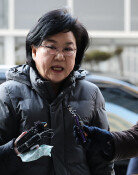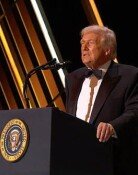[Editorial] Pres. Lee Cannot Repeat Mistakes of 1st Year
[Editorial] Pres. Lee Cannot Repeat Mistakes of 1st Year
Posted February. 25, 2009 07:41,
President Lee Myung-bak was elected on his pledge to be an economy president. In his inauguration speech, he promised to make the country a better place to live, develop the economy, unite society, strengthen national security, and lay the groundwork for reunification of the Korean Peninsula. With these pledges, he declared 2008 the starting year for the advancement of the Republic of Korea. Accordingly, Koreans pinned high hopes on him. The first year of the administration, however, fell far short of expectations. Though factors such as the global economic crisis and staunch resistance from the opposition hampered his agenda, President Lee cannot escape blame for showing lack of ability to manage state affairs. In a word, the people are disappointed at his performance.
The people no longer want him to deliver on his overambitious pledges of raising annual economic growth to seven percent, per capita income to 40,000 U.S. dollars, and the Korean economy to No. 7 in the world rankings in 10 years. What Koreans do want is for the economy not to deteriorate further. Though the economic crisis was triggered by the U.S. financial sector, the Korean government cannot put the blame on external factors for the economic downturn. The specter of massive unemployment, nosedive in investment, and instability of the domestic financial market is looming over Korea.
The parliamentary passage of bills is urgent, such as those on deregulation, the separation of finance and industry capital, and lifting cross-shareholding restrictions. They are aimed at revving up investment and boosting competitiveness. Yet the government remains powerless, only relying on the National Assembly. Corporate restructuring has been delayed and companies and households still suffer from liquidly shortages. Though the Lee administration says it wants to reduce red tape, it has failed to get rid of malicious regulations that hinder the smooth flow of the market economy.
Public sector reform has made no significant progress, either. Of 305 state-run organizations, only 25 have been affected and consolidated into 11 public corporations. The pledge to turn the government into a capable organization that does its job well has long dissipated. State organizations are at odds with each other and are busy delegating responsibilities to each other, while creating committees the government once pledged to eliminate.
President Lee has stressed the need to restore law and order as his 11th priority among 100 state tasks. Few agree that law and order is taking hold in the country, however.
Police have been frequently attacked by anti-American and pro-North Korea forces and failed to take proper action against illegal protests. When the country last year was gripped by candlelight vigil protests against the resumption of U.S. beef imports, President Lee disappointed his supporters by betraying his sentimental character. He said he went to the hill at the back of the presidential office to reflect on the situation and sang Morning Dew, a popular song among pro-democracy advocates. In dealing with the Jan. 20 deadly clash between police and squatters that killed six people in Seouls Yongsan district, he showed opportunistic behavior by allowing the Seoul police chief to resign though police did nothing wrong in the incident.
Controversy over improper personnel management has plagued previous administrations. The incumbent administrations appointments, however, have been particularly riddled with problems. Even if a narrow pool of talent is considered stemming from the conservative partys failure to take power for a decade, President Lee went overboard by unduly favoring dignitaries and his close confidants over those with experience and capabilities in filling government posts. This has resulted in a host of Cabinet members who lack competence and abilities to handle state affairs.
To be fair, the Lee administration did make certain achievements in its first year. It restored bilateral relations with the United States, which had been in tatters over the past decade, to a strong alliance and strengthened cooperation with other allies such as Japan. Though inter-Korean relations remain frozen due to President Lees hard-line stance toward the North, Seouls stance deserves praise for sticking to principles.
Marking the first anniversary of President Lees term, the presidential office said the government has been on two tracks in its first year: overcoming the economic crisis and preparing for further progress and prosperity. It also cited major achievements in allaying worries over another financial crisis through currency swap agreements with major economies; improving relations with neighboring countries including the United States, Japan, and China; easing regulations to revive the economy; paving the way to find new growth engines; and streamlining state organizations. This self-assessment, however, is a far cry from the peoples perception. The gap in assessment will further deteriorate public confidence in the government.
The inauguration of a new administration inevitably brings conflict, social discord and mistakes. Korea, however, can no longer afford more mistakes and mismanagement. President Lee must reflect on what he did wrong and learn lessons from his mistakes to make a fresh start. His administrations fate hinges on its second-year performance.




![반찬통 착색 고민 끝…‘두부용기’ 버리지 말고 이렇게 쓰세요 [알쓸톡]](https://dimg.donga.com/c/138/175/90/1/wps/NEWS/IMAGE/2026/01/09/133126593.3.png)


